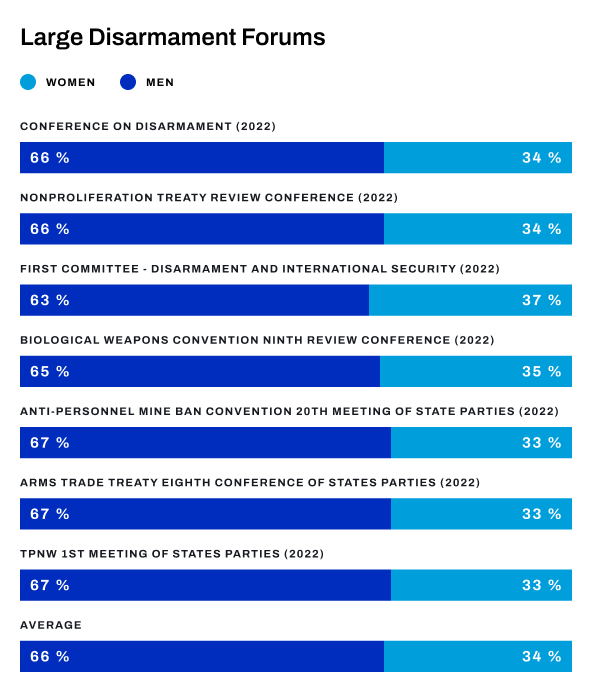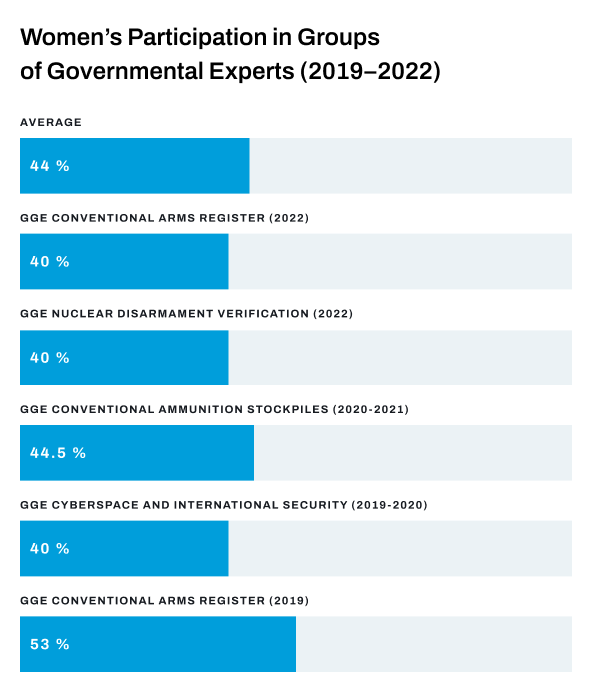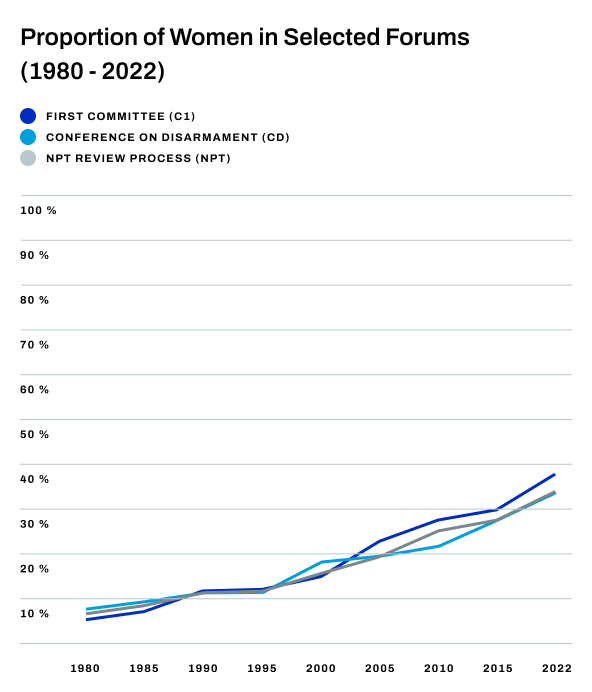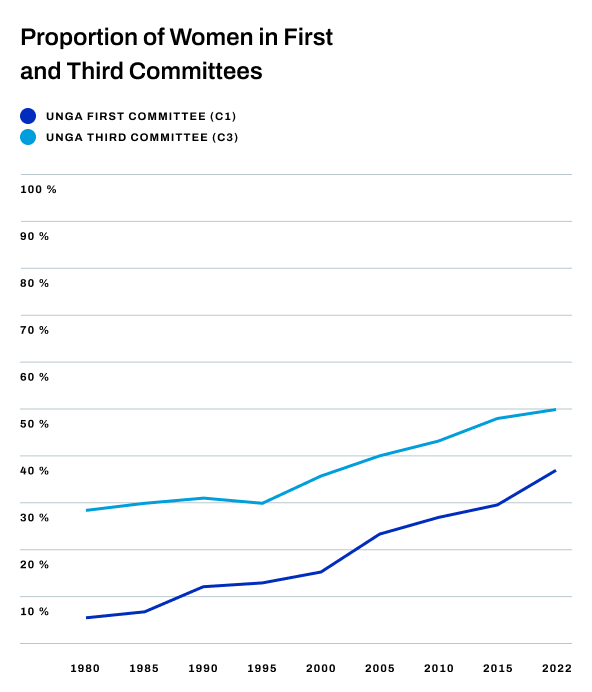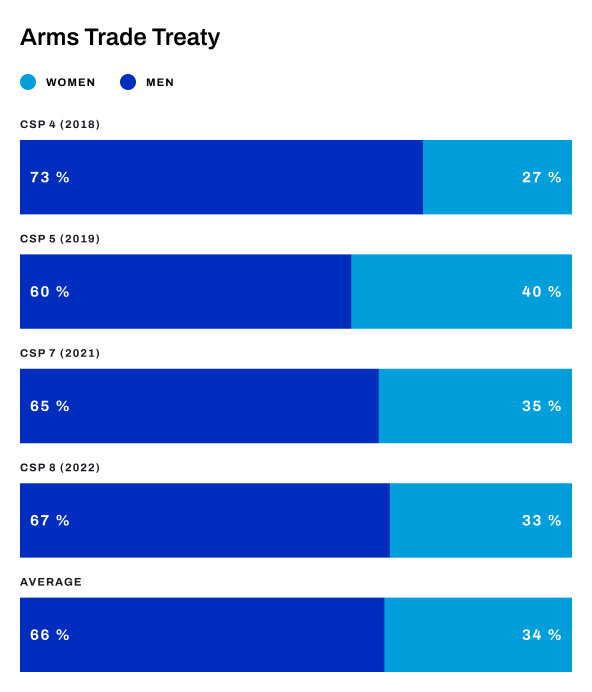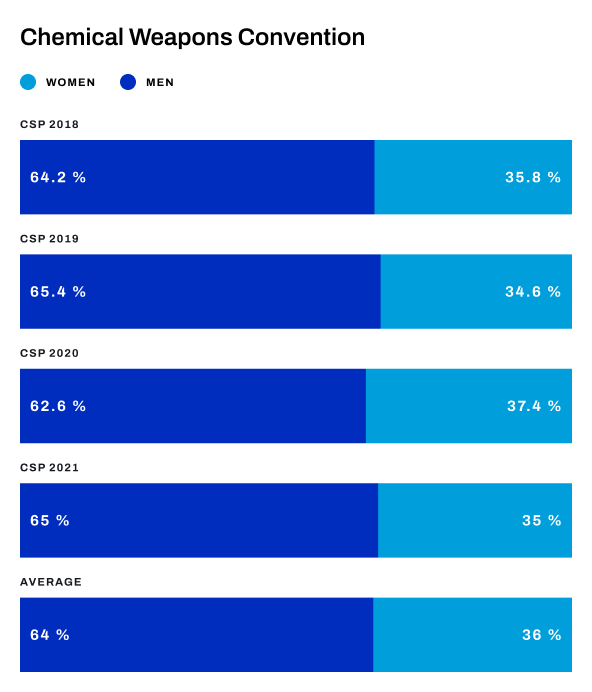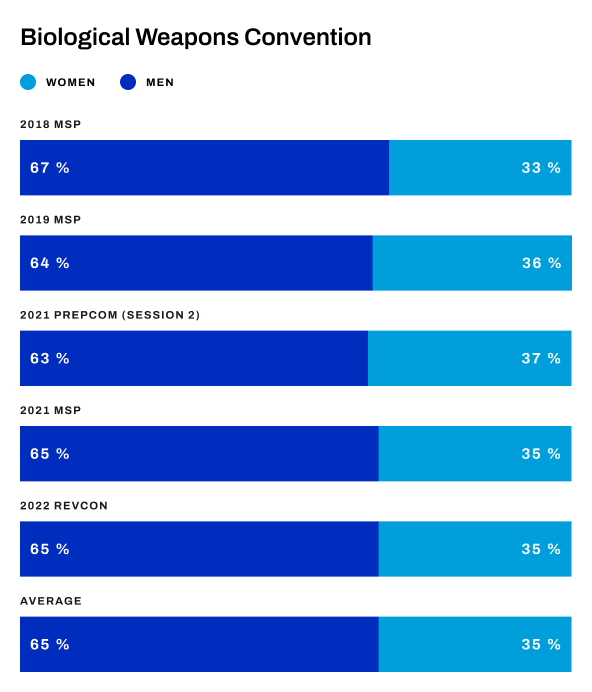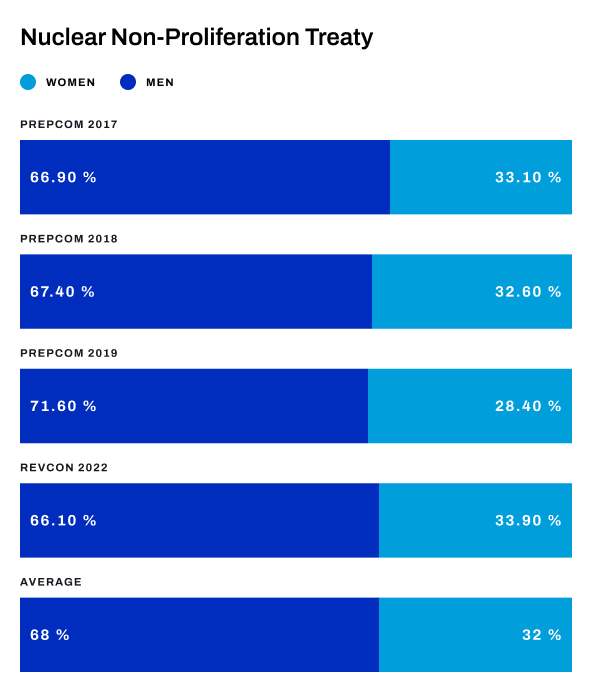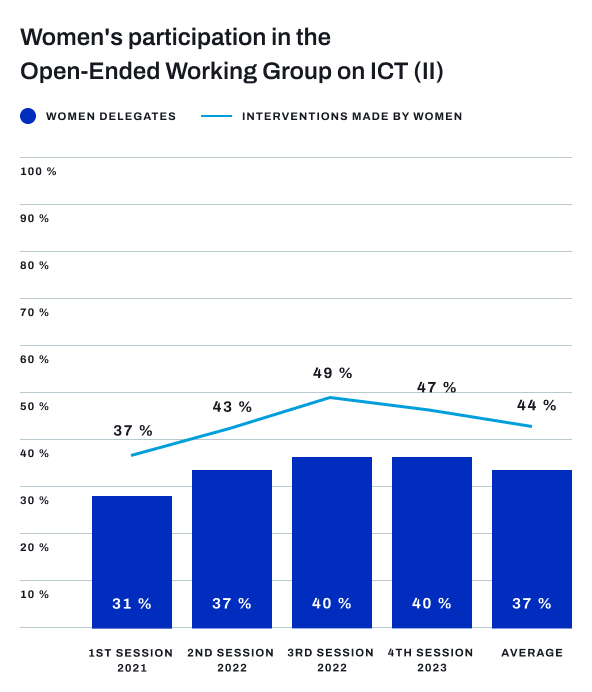About the Hub
How does this relate to arms control and disarmament?
Perspectives
The Arms Trade Treaty (ATT)
Under Article 7 of the Arms Trade Treaty (ATT), it is illegal to transfer weapons if there is a risk that the weapons will be used to commit or facilitate serious acts of Gender-Based Violence (GBV). In practice, this means that States Parties conducting risk assessment processes for the export and import of weapons have to take into account the legislative and normative factors around GBV in the recipient countries.
In 2019, the Fifth Conference of States Parties to the ATT focused on the Treaty’s gender provisions and adopted a decision encouraging States Parties to take action on gender and GBV, such as collecting gender-disaggregated data within their national crime and health statistics, including gender-disaggregated data on victims of armed violence and conflict, and making this data publicly available. States Parties also decided that the ATT Secretariat should report on overall progress among delegations in achieving gender balance.
The Final Report adopted at the 10th Conference of States Parties, in 2024, called on the ATT Secretariat to also gather gender-disaggregated attendance data at ATT Working Group and Preparatory meetings. Furthermore, it encouraged eligible States Parties to apply for the ATT Voluntary Trust Fund to support initiatives aimed at mitigating the risk of GBV and Violence Against Women and Children.
At the 11th Conference of States Parties, in 2025, States adopted a decision to appoint one or more voluntary gender focal points. The role of the gender focal point(s) is to promote the systematic integration of gender perspectives across all ATT processes, in support of the Treaty’s effective implementation.
Want to learn more? Check out UNIDIR’s Report Addressing Weapons in Conflict-Related Sexual Violence: The Arms Control and Disarmament Toolbox and Factsheet on Gender and the Arms Trade Treaty.
The UN Programme of Action to Prevent, Combat and Eradicate the Illicit Trade in Small Arms and Light Weapons (UN PoA SALW)
The UN Programme of Action to prevent, combat and eradicate the illicit trade in small arms and light weapons in all its aspects (UN PoA SALW) recognizes the negative impact of the illicit trade in SALW on women.
In 2024, at the Fourth Review Conference of the UN PoA, UNIDIR co-submitted the working paper “From Research to Policy: Prospects for Gender-Transformative Small Arms Control”. The paper underscored the importance of data and analysis in informing the design of policies to address the gender-differentiated impacts of armed violence. It proposed concrete recommendations towards gender-transformative arms control, including better data collection, enhanced coordination with relevant multilateral frameworks, such as the Women, Peace and Security agenda, and an inclusive approach to SALW control policy making.
The Outcome Document adopted by the Fourth Review Conference of the UN PoA, in 2024, acknowledged the differential impacts of the illicit trade in SALW on women, men, girls, and boys. It called for tailored response mechanisms to address these impacts, including mental health impacts, as well as to combat gender-based and conflict-related sexual violence.
The 2024 Outcome Document stressed the need to address the persistent barriers to the full, equal, meaningful and effective participation and representation of women, including in leadership roles in all decision-making, planning and implementation processes related to the PoA. It also encouraged the engagement of men and boys in mainstreaming a gender perspective into SALW control.
The 2024 Outcome Document included a recommendation for data collection related to the differential impacts of the illicit trade in SALW disaggregated by sex, age, disability and other characteristics relevant in national contexts. It underscored the importance of coordination between national authorities responsible for implementing the PoA and those responsible for women’s affairs, gender equality, and youth¸ as well as civil society groups. All of this could enhance understanding of gender-specific impacts and contribute to improving national policies and programmes.
Want to learn more? Check out UNIDIR’s report Addressing Weapons in Conflict-Related Sexual Violence: The Arms Control and Disarmament Toolbox (available in French) as well as Women Managing Weapons (available in French).
The Anti-Personnel Mine Ban Convention (APMBC)
The Anti-Personnel Mine Ban Convention (APMBC) aims to end the causalities and suffering caused by anti-personnel mines through four main objectives: ensuring universal adherence, clearing mined areas, destroying stockpiled mines and assisting the victims.
During the Fifth Review Conference of the APMBC, held in Cambodia in 2024, States Parties agreed on the adoption of the Siem Reap-Angkor Action Plan and the Siem Reap-Angkor Declaration to ensure the implementation of the convention, in which States Parties reaffirmed their commitment to advancing gender equality and promoting gender-balanced participation in all aspects of mine action. States Parties also recognised the importance of synergies with other international frameworks such as the Women, Peace and Security agenda.
The Siem Reap-Angkor Action Plan requires countries to mainstream gender considerations in mine action programming, including mine risk education and victim assistance. When reporting on these programmes, States Parties have to present data disaggregated by gender and age, among other factors.
In accordance with the working methods of the Convention’s Committees, each of the five Committees appoints a focal point to provide advice on gender mainstreaming and ensure that the diverse needs and experiences of people in affected communities are taken into account in the implementation of the Convention.
In 2024, the APMBC Gender Focal Points submitted the working paper Gender & Diversity Mainstreaming Progress Under the Oslo Action Plan and Looking Ahead to the Siem Reap-Angkor Action Plan. The Gender Focal Points also presented and discussed their work during a side event co-organized by UNIDIR in the margins of the Siem Reap-Angkor Summit on a Mine-Free World.
Want to learn more? Check out UNIDIR’s report Beyond Oslo: Taking Stock of Gender and Diversity Mainstreaming in the Anti-Personnel Mine Ban Convention and the factsheet on Gender and Diversity in the Anti-Personnel Mine Ban Convention.
The Convention on Cluster Munitions (CCM)
The Convention on Cluster Munitions (CCM) contains an obligation for States Parties to provide age- and gender-sensitive victim assistance, including medical care, rehabilitation and psychological support, and to ensure the social and economic inclusion of victims (Article 5). This provision is important as it stipulates equal access to services and resources.
The Lausanne Action Plan (2020-2026) directs States Parties to collect and analyze gender, age and disability disaggregated data in relation to a number of cross-cutting actions, such as surveying and clearance of cluster munition remnants, risk education, victim assistance and the development of laws, policies and programmes. Through these actions, State Parties commit to ensuring that the different needs, vulnerabilities and perspectives of women, girls, boys and men from diverse populations and all ages are considered and inform the implementation of the Convention.
The Second Review Conference of the CCM, held in 2021, decided that the Coordinators on General Status and Operation would act as Gender Focal Points to provide advice to States Parties on gender mainstreaming. In 2022, France and Namibia submitted a working paper outlining Terms of Reference for the CCM Gender Focal Points.
At the 12th Meeting of States Parties, in 2024, a group of 26 States Parties and UNIDIR submitted a working paper that provided a mid-point review of the implementation of gender-related action points agreed as part of the Lausanne Action Plan. The working paper was presented and discussed during a side event, where States Parties and stakeholders took stock of gender, diversity and inclusion within the CCM and considered measures to strengthen the implementation of the Lausanne Action Plan.
Want to learn more? Check out UNIDIR’s Factsheet on Gender and Diversity in the CCM and Explainer: How Do Gender and Diversity Relate to Mine Action?
Declaration on Explosive Weapons in Populated Areas (EWIPA)
In November 2022, The Political Declaration on Strengthening the Protection of Civilians from the Humanitarian Consequences Arising from the Use of Explosive Weapons in Populated Areas (EWIPA) was adopted and endorsed by more than 80 States. In its preamble, the Declaration recognizes the importance of collecting data disaggregated by sex and age on civilian harm from the use of EWIPA. In its operative section, the Declaration directs States to “collect, share, and make publicly available disaggregated data on the direct and indirect effects on civilians” and to “adopt a holistic, integrated, gender-sensitive, and non-discriminatory approach” to victim assistance. These provisions are important to enhance the protection of civilians in an armed conflict and to ensure more sustainable relief and recovery efforts.
Want to learn more? Check out UNIDIR’s Factsheet: Gendered Impacts of Explosive Weapons in Populated Areas and the Menu of Indicators to Measure the Reverberating Effects on Civilians from the Use of EWIPA.
The Global Framework for Through-life Conventional Ammunition Management (GFA)
In 2023, the Open-ended Working Group on Conventional Ammunition concluded its mandate with the adoption of the Global Framework for Through-life Conventional Ammunition Management—a voluntary set of 15 objectives designed to enhance the safety, security and sustainability of ammunition management throughout its lifecycle.
Objective 14 of the Framework is dedicated to strengthening gender mainstreaming and the full, equal, meaningful and effective participation of women in through-life conventional ammunition management, including in policy and decision-making processes, planning, implementation, and review.
Beyond this standalone objective, gender considerations are cross-cutting and included in:
- Objective 8 which highlights the risk of diverted ammunition being used to perpetrate gender-based violence and emphasizes the need to consider its differentiated impacts on women, men, girls and boys.
- Objective 13 which promotes the collection and use of sex- and age-disaggregated data to better understand the role of diverted ammunition in various forms of armed violence, including gender-based violence.
Additionally, Article 19 of the Framework encourages States to include gender mainstreaming as a key area of international cooperation and assistance.
In 2025 States held a preparatory meeting to determine the review process for the framework. On that occasion, a group of States, together with UNIDIR and the Small Arms Survey, submitted a working paper on “Ensuring women’s full, equal, meaningful and effective participation in ammunition through-life management”.
Want to learn more? Check out Implementing the Global Framework for Through-life Conventional Ammunition Management – A Voluntary Guide by AMAT, CAR, UNIDIR and UNODA.
The Nuclear Non-Proliferation Treaty (NPT)
Studies have underlined that ionizing radiation does not affect men and women equally. While the detonation of one or more nuclear weapons would cause massive death and injury to all, scientific research shows that women and girls have a far higher risk of developing cancer than men or boys. This finding has been highlighted by several States Parties to the Nuclear Non-Proliferation Treaty (NPT) throughout the past review cycle.
In 2022, at the Tenth Review Conference of the NPT, a Joint Statement on Gender, Diversity and Inclusion was delivered by 67 countries. The statement underscored the importance of full, equal and effective involvement of women in all aspects of the NPT, highlighted that nuclear weapons have different effects on different demographics, and that the intersections of race, gender, economic status, geography, nationality, and other factors must be taken into account as risk-multiplying factors in relation to nuclear weapons.
Gender-related topics were reflected in the Draft Final Document of the Tenth Review Conference of the NPT, which contained multiple references to gender issues, especially in relation to women’s meaningful participation and leadership in the NPT implementation and review. This language was accepted by all States Parties despite the fact that there was no consensus on a final document.
In 2023, at the First session of the Preparatory Committee for the 2026 Review Conference, a working paper on “Taking Forward Gender Mainstreaming Efforts in the NPT” was submitted by Australia, Canada, Ireland, Mexico, Namibia, Norway, Panama, Philippines, Spain, Sweden, Thailand, and UNIDIR. The paper considers practical ways to promote women’s participation and leadership in the NPT and gives entry points to implement gender analysis in nuclear policymaking.
In 2025, at the Third session of the Preparatory Committee for the 2026 Review Conference, a working paper on the NPT and the Women, Peace and Security Agenda was submitted by a cross-regional group of 24 States and UNIDIR. It called on States Parties to recognise the importance of and commit to ensure the equal, full and meaningful participation and leadership of women in the implementation and review of the NPT, among other actions.
Want to learn more? Check out UNIDIR’s collection of policy papers From the Margins to the Mainstream: Advancing Intersectional Gender Analysis of Nuclear Non-Proliferation and Disarmament, as well as UNIDIR’s report Gender, Development and Nuclear Weapons: Shared Goals, Shared Concerns.
The Treaty on the Prohibition of Nuclear Weapons (TPNW)
The Treaty on the Prohibition of Nuclear Weapons (TPNW) includes a clause mandating States Parties to provide age- and gender-sensitive assistance to individuals under its jurisdiction who are affected by the use or testing of nuclear weapons, including medical care, rehabilitation and psychological support, as well as provide for their social and economic inclusion (Article 6).
The preamble of the Treaty acknowledges that nuclear weapons have a disproportionate impact on women and girls, including as a result of ionizing radiation. It also recognizes the need for the “equal, full and effective participation of both women and men” in promoting peace and security, and the engagement of women in nuclear disarmament.
During the First Meeting of States Parties to the TPNW, held in Vienna in 2022, a working paper co-sponsored by UNIDIR, Chile, Ireland and Mexico proposed actions to operationalize the gender provisions of the Treaty.
The Vienna Action Plan was adopted by TPNW States Parties in 2022. As part of the Action Plan, States Parties resolved to “integrate gender considerations across the work of the Treaty’s implementation” (Action 39) and “recommend that gender considerations are taken into account across all TPNW-related national policies, programs and projects” (Action 47) . They also agreed to “establish a geographically diverse and gender balanced network of experts to support the goals and TPNW” (Action 34) and to establish a Gender Focal Point to support the implementation of the gender provisions of the Treaty and report on progress made to the 2MSP (Action 48). Additionally, States Parties decided to begin working on guidelines for ensuring age- and gender-sensitive Victim Assistance (Action 49), as well as guidelines for the integration of gender perspectives in international cooperation and assistance (Action 50).
In 2023, TPNW States Parties adopted a political declaration and a package of decisions. The political declaration reaffirmed the gender provisions of the Treaty and considered equal, full and meaningful participation of women and men as essential in nuclear disarmament. The declaration also mentioned the disproportionate impacts of nuclear weapons on women and girls.
Chile, in its capacity as a gender focal point, presented a report highlighting activities carried out during the intersessional period with a view to supporting States in their gender mainstreaming efforts. Mexico has succeeded Chile as TPNW’s Gender Focal Point.
Want to learn more? Check out UNIDIR’s report Gender, Development and Nuclear Weapons: Shared Goals, Shared Concerns
The Biological Weapons Convention (BWC)
The Biological Weapons Convention (BWC) prohibits the development, production, acquisition, transfer, stockpiling, and use of biological and toxin weapons. Research has shown the different levels of susceptibility between women and men to some diseases and the different levels of exposure they might be subject to due to caregiving responsibilities in the domestic sphere. Gender roles also impact experiences of social stigma differently, and impacts of post-traumatic stress disorder related to different diseases and outbreaks are also different based on gender.
In the 2022 Ninth Review Conference of the BWC, a working paper on enhancing gender equality and women’s empowerment in the BWC and a language proposal for inclusion in the final document were submitted by Panama. Additionally, UNIDIR and a group of States organized a photo exhibition, which portrayed women professionals from all regions who work in the field of biosecurity.
Want to learn more? Check out UNIDIR’s Factsheet on Gender and Biological Weapons and the report Missing Links: Understanding Sex- and Gender-Related Impacts of Chemical and Biological Weapons.
The Chemical Weapons Convention (CWC)
The Chemical Weapons Convention (CWC) prohibits the development, production, stockpiling and use of chemical weapons and their destruction. Research has shown that sex-and gender-disaggregated data, as well as knowledge of gender perspectives, could improve preparedness in the event of a chemical attack and enhance the effectiveness of international assistance.
At the 2022 Conference of the States Parties, a joint statement on gender equality was delivered by Costa Rica on behalf of a group of States. The statement underscored gender as a cross-cutting issue that should be considered in all aspects of the convention, including the provision of care and assistance to women affected by chemical weapons, among other areas.
At the 2023 Fifth Review Conference of the CWC, a working paper on the importance of advancing gender equality considerations was presented by Canada and co-sponsored by more than 50 States.
Want to learn more? Check out UNIDIR’s Factsheet on Gender and Chemical Weapons and the report Missing Links: Understanding Sex- and Gender-Related Impacts of Chemical and Biological Weapons.
The Open-ended Working Group (OEWG) on Developments in the Field of Information and Telecommunications in the Context of International Security
During the 2019 and 2020 meetings of the Open-ended Working Group (OEWG) on Developments in the field of information and telecommunications in the context of international security, a large number of delegations called attention to potential gendered impacts of ICT-incidents, as well as the global gender gap in access to and use of the internet. Papers submitted to the OEWG proposed that gender equality and the meaningful participation of women should be at the central of international peace and security in cyberspace. New research exploring how gender norms shape specific activities related to cybersecurity was presented in side events and multiple civil society organizations highlighted the importance of gender mainstreaming in cyber policies.
Adopted in March 2021, the OEWG’s final report acknowledged the high level of women’s participation in OEWG sessions as well as the prominence of gender perspectives in its discussions, and underscored the importance of narrowing the “gender digital divide” and of promoting the effective and meaningful participation and leadership of women in decision-making processes. Additionally, the final report proposed that capacity-building efforts should “respect human rights and fundamental freedoms, be gender sensitive and inclusive, universal and non-discriminatory”.
In 2020, a second OEWG on ICTs in the context of international security was established by the UN General Assembly, with a mandate set for 2021-2025.
Want to learn more? Check out UNIDIR’s reports Gender Approaches to Cybersecurity (available in Spanish) and System Update: Towards a Women, Peace and Cybersecurity Agenda (available in Spanish).
The Open-Ended Working Group on Reducing Space Threats
At the end of 2020, pursuant to UNGA resolution 76/231, an Open-Ended Working Group (OEWG) was established to make recommendations on possible norms, rules and principles of responsible behaviours relating to threats by States to space systems. As part of OEWG discussions, a number of States highlighted the need to ensure geographical, stakeholder, and gender diversity. With regards to gender diversity specifically, some States have underscored the importance of equal participation of women and men and the need to assess the potential differentiated impacts of threats to space systems.
The topic of gender equality and space security was debated in a side event to the second session of the OEWG, in September 2022. Experts and practitioners discussed issues such as women’s participation and leadership in the space industry and diplomacy; mainstreaming gender approaches to space law, norms and standards; and harnessing space technology for sustainable development and gender equality.
The Group of Governmental Experts on Lethal Autonomous Weapons (GGE on LAWS)
Over the past years, a number of States and civil society representatives participating in the meetings of the Group of Governmental Experts (GGE) on Lethal Autonomous Weapons Systems (LAWS), convened under the Convention on Certain Conventional Weapons (CCW), have expressed concern that algorithm-based weapons like LAWS have the potential to perpetuate or amplify existing social biases, including gender bias.
In 2024, a group of States presented the working paper Addressing Bias in Autonomous Weapons, which highlighted the risks of gender and racial biases, among others, stemming from algorithmic biases in autonomous weapons. The paper proposed measures to mitigate biases, including testing, transparent documentation of data sets, benchmark evaluations, and training.
Want to learn more? Check out UNIDIR’s Report Does Military AI Have Gender? Understanding Bias and Promoting Ethical Approaches in Military Applications of AI and Factsheet on Gender and Lethal Autonomous Weapons Systems.
The United Nations General Assembly (UNGA) First Committee Resolutions
UNGA First Committee resolutions have played an instrumental role in acknowledging and addressing gender equality in international security.
In its 79th Session in 2024, the General Assembly adopted 77 resolutions proposed by the First Committee, of which 26 featured gender-related provisions that call for women’s equal participation, stress the gendered impacts of weapons and armed violence and/or highlight gender considerations in disarmament efforts.
In 2024, States delivered a joint statement on gender, emphasizing the importance of integrating gender perspectives into disarmament efforts. They noted that a gender lens produces more sustainable and effective policy solutions and addresses the different impacts of armed conflict on women, men, girls and boys. The statement received support from 80 States and called for concrete actions to enhance women’s representation and leadership in disarmament decision-making, both regionally and globally.
Every two years, the General Assembly adopts a resolution specifically focused on promoting “equal opportunities for the representation of women in all decision-making processes with regard to matters related to disarmament, non-proliferation and arms control, in particular as it relates to the prevention and reduction of armed violence and armed conflict.” Known as Women, Disarmament, Non-Proliferation and Arms Control, the resolution is led by Trinidad and Tobago and was first introduced in 2010. In 2024, 83 States co-sponsored the resolution.
Want to learn more? Check out the Gender & Disarmament Resource Pack by the International Gender Champions Disarmament Impact Group.
The Open-ended Working Group (OEWG) on Security of and in the Use of Information and Communications Technologies
In 2020, the UN General Assembly established a second OEWG on ICTs in the context of international security. During the meetings of this second OEWG (2021-2025), several States drew attention to the gendered dimensions of cybersecurity and stressed the need to address gender equality across all six pillars of the OEWG mandate and international peace and security.
The first annual progress report (2022) welcomed the strong participation of women delegates in the OEWG and underscored the importance of narrowing the gender digital divide. The second (2023) and third (2024) annual progress reports reiterated these points and emphasized the necessity of a gender perspective in discussions of ICT threats and capacity-building, linking such efforts to broader development goals.
The Final Report (2025) reaffirmed these commitments, underscoring the importance of continuing to narrow the gender digital divide and promoting the full, equal and meaningful participation and leadership of women in decision-making processes on international ICT security. It noted and welcomed the increasing level of participation of women delegates in the OEWG and the prominence of a gender perspective in its discussions.
A group of States submitted a working paper on Gender and the Future Mechanism, outlining recommendations for integrating gender into the Global Mechanism on ICT security, scheduled to hold its first organizational session in March 2026.
Throughout the process, research and side events addressed gender mainstreaming in the interpretation and implementation of the 11 norms of responsible State behaviour, gender-based vulnerabilities in international cybersecurity, and gender perspectives on cyber capacity-building, among other issues.
Want to learn more? Check out UNIDIR’s reports Gender Approaches to Cybersecurity (also available in Spanish), System Update: Towards a Women, Peace and Cybersecurity Agenda (also available in Spanish), and A Novel Approach to the 11 UN Norms for Responsible State Behaviour in Cyberspace: Guidelines for Gendered Implementation (also available in Spanish).
